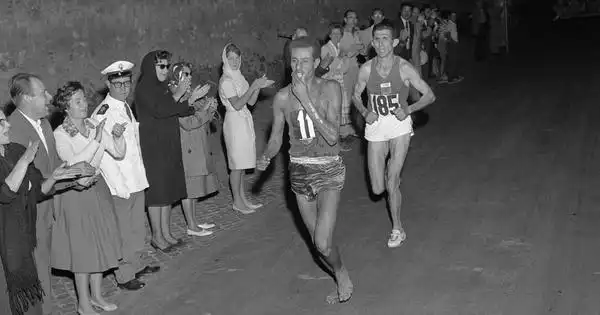Introduction:
In the illustrious history of the Olympic Games, one extraordinary moment stands out – Abebe Bikila’s barefoot run in the marathon at the 1960 Rome Olympics. This incredible feat not only secured him a gold medal but also left an indelible mark on the world of sports. Let’s delve into the fascinating story behind why Abebe Bikila chose to run the marathon barefoot and how this decision turned him into an Olympic legend.

The Journey Begins:
Abebe Bikila, a talented Ethiopian runner, entered the 1960 Rome Olympics with the dream of making history. Little did the world know that he would achieve this in a most unconventional way. Bikila had trained and run barefoot in his native Ethiopia, a land known for its challenging terrains. He believed that running without shoes allowed him to connect with the earth and run more freely.

Ethiopian Roots:
Bikila’s decision to run barefoot was deeply rooted in his Ethiopian heritage. The Ethiopian landscape, with its rugged paths and uneven surfaces, had been his training ground. He honed his skills by running barefoot, strengthening his feet and developing a unique connection with the ground beneath him. As he stepped onto the Olympic stage, he carried the spirit of Ethiopia with him, opting for the same barefoot technique that had brought him success in his homeland.

The Quest for the Perfect Shoes:
Interestingly, despite the advancements in athletic footwear technology, Bikila struggled to find the perfect pair of shoes for the marathon. As the race approached, he faced a dilemma – wear ill-fitting shoes or embrace the technique that had served him well in Ethiopia. Faced with this decision, Bikila opted for the unconventional choice – he would run the marathon barefoot, relying on the strength and resilience of his feet.

The Rome Olympics:
On September 10, 1960, history was made at the Rome Olympics. As the marathon unfolded, spectators watched in awe as Abebe Bikila, with determination etched on his face, pounded the streets of Rome without the support of traditional running shoes. The 42-kilometer journey saw Bikila not only conquer the course but also become the first African to win an Olympic gold medal in the marathon.

A Triumph of Spirit:
Bikila’s barefoot triumph was more than a physical feat; it was a triumph of the human spirit. Running without shoes symbolized resilience, adaptability, and a deep connection to one’s roots. His victory resonated far beyond the finish line, inspiring generations of athletes to think outside the box and embrace their unique strengths.

Legacy and Impact:
Abebe Bikila’s barefoot run left an enduring legacy in the world of sports. He proved that success could be achieved through unconventional means and that determination could overcome the greatest challenges. His story continues to inspire young athletes worldwide, encouraging them to pursue their dreams with passion and creativity.

Conclusion:
In the annals of Olympic history, Abebe Bikila’s barefoot run at the 1960 Rome Olympics remains an unforgettable chapter. It was a testament to the power of perseverance, cultural pride, and the unyielding spirit of a remarkable athlete. As we celebrate the feats of today’s sporting heroes, let us not forget the barefoot champion who defied convention and left an indelible mark on the world stage.
For more interesting articles, please visit www.kidzherald.com




